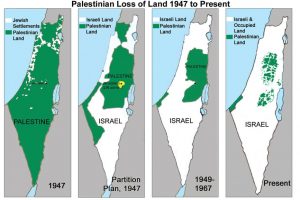Israel-Palestine conflict
Background
- Jerusalem lies in the heart of the Israel-Palestine conflict. The tussle is over who gets to control the ancient city that is sacred to Jews, Muslims and Christians.
- After the end of the First Arab-Israel War in 1948, Jerusalem was partitioned into West and East, under Israeli and Palestinian control respectively.
- But in 1967, during the Six-Day Arab-Israel War, Israel occupied East Jerusalem from Jordanian forces, and Israel’s Parliament declared the territory had been annexed to Israel.
- This marginalised the Palestinians, who wanted East Jerusalem to be their capital under the “two-state solution”.
What is it?
- Its basis is two separate states, Israel and Palestine, living peacefully side by side on the land between the western bank of the Jordan river and the Mediterranean Sea.
- This territory would be divided broadly along the pre-1967 armistice line or “green line”.

- Jerusalem, which both sides want as their capital, would be shared.
- Past negotiations have failed to make progress and there are currently no fresh talks in prospect.
Oslo Accords & India’s position
- Despite Israel’s hold over the Jerusalem, in 2016, the UN reaffirmed that Jerusalem’s Palestinian territories were under “hostile occupation”.
- Undeterred by the refusal of the international community to endorse the annexation, Israel further expanded settlements in the territories of East Jerusalem.
- Under the Oslo Accords of the 1990s, both Israel and the Palestinians agreed that the status of settlements would be decided by negotiations. But the negotiations process has been stalled for several years now.
- India has traditionally backed a two-state solution to resolve the Israel-Palestine conflict.
Why in News?
- Israeli Prime Minister Benjamin Netanyahu recently said he is planning to effectively annex parts of the occupied West Bank.
What is the West Bank?
- It is a chunk of land located – as the name suggests – on the west bank of the River Jordan and bounded by Israel to the north, west and south. To its east lies Jordan.
- Since the Six-Day War in 1967, also known as the Third Arab-Israeli War, the West Bank has been occupied by Israel. Both Israelis and Palestinians assert their rights to the territory of the West Bank and its disputed status and the conflict has not been resolved as yet.
- Between 2.1 million and 3 million Palestinian Arabs live in the West Bank under both limited self-rule and Israeli military rule.
- The West Bank is also home to some 430,000 Israeli Jews who live in 132 settlements built under Israel’s occupation.
- The vast majority of the international community considers the settlements illegal under international law, though Israel disputes this interpretation.
Possible repercussions
- Palestians have sought the entire territory of the West Bank and the Gaza strip (a self-governing Palestinian territory on the eastern coast of the Mediterranean Sea) for an independent Palestinian state in the future, to which they claim historical right.
- Israel, on the other hand, claims that it has historical and religious rights over the West Bank because it believes that the territory is the ancestral land of the Jewish people.
- These annexation plans have been extremely controversial because it would mean Israel unilaterally declaring sovereignty over parts of occupied Palestinian territory in the West Bank. Such moves are also contrary to the two-state solution and have the potential to trigger further conflict in the region.
Subscribe
Login
0 Comments
